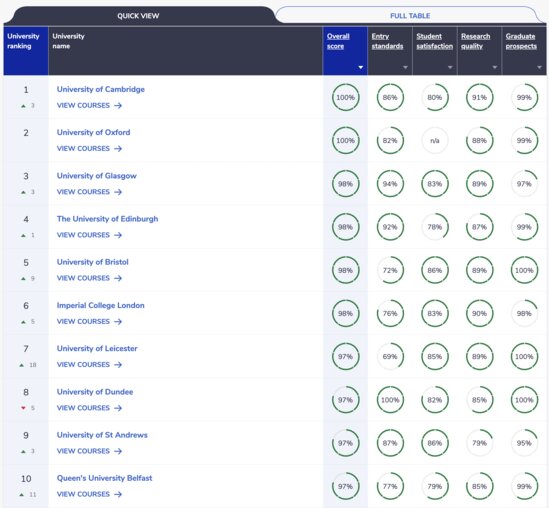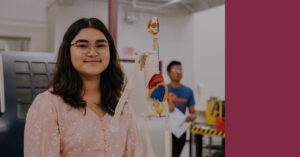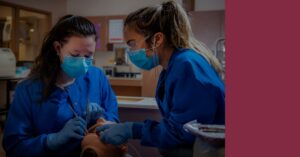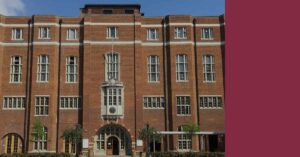Welcome to our UK Medical School Review series. In this series, we work with current students to produce an in-depth overview of each UK Medical School, covering what it is like to study there, how the course looks and what you need to get in.
Today we are exploring Leicester Medical School, a leading research-intensive university in the UK. Ahmad, a Leicester Medic, will share his experiences and insights as a current student throughout.
Let’s start with some history of Leicester Medical School…
Overview Of Leicester Medical School
About Leicester Medical School
The Royal Commission on Medical Education believed the UK needed to be training over 4500 Doctors a year by 1994. In order to achieve this, new Medical Schools were established, including in the city of Leicester. Leicester joined with Warwick in 2000 to create the Leicester-Warwick Medical School which was eventually separated in 2007 resulting in the separate institutions of Warwick Medical School and Leicester Medical School.
As of today, Leicester Medical School offers 2 Medicine programmes: the 5-year Undergraduate course and the 6-year Medicine with a Foundation Year course. There is no 4-year accelerated Graduate course offered, however, Graduates are welcome to apply to the standard 5-year Undergraduate programme.
Leicester Medical School
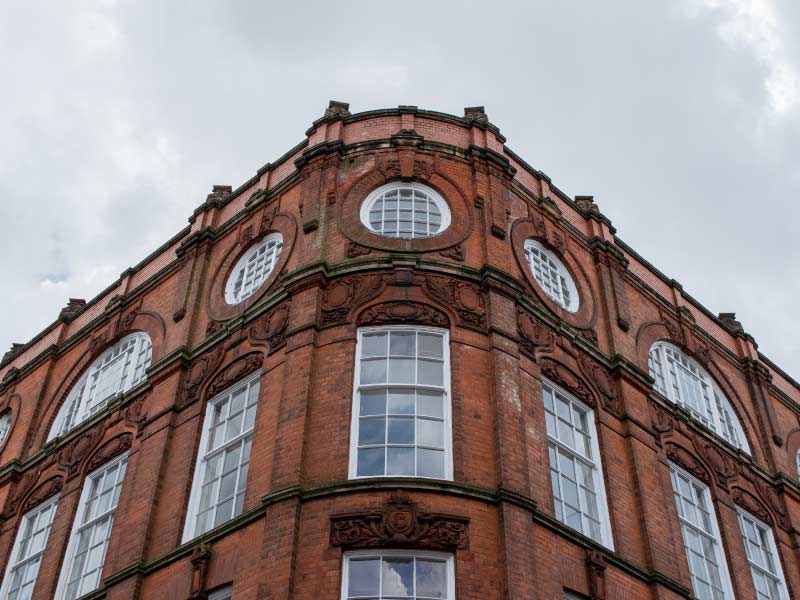
- University Age: 65
- UK Ranking: 7th
- Pint Price: £3.00
- Alumni Notability: 7/10
- A-level Requirements: AAA
- Places Available: 290
- Applicant Success Rate: 12%
- Teaching Style: Integrated
- Interview Style: MMI
- Admissions Test: UCAT
Leicester Medical School Alumni
Notable alumni from Leicester Medical School include Sir Liam Joseph Donaldson, the previous Chief Medical Officer for England. The University of Leicester has also received attention for the invention of genetic fingerprinting and contributed to the discovery and identification of King Richard III’s remains.
Why did you choose to study at Leicester?
“I choose Leicester Medical School because it offered cadaveric dissection and this is a unique selling point. I believe that cadaveric dissection is the best way to learn anatomy as it allows you to appreciate the nuances in human anatomy.
The second reason I chose the University of Leicester was due to the way that the course was structured: I think the mixture of lectures and group work allows one to fully understand and consolidate the material learnt. I also found the medical students, who I met on the open day, to be extremely accommodating and the accommodation and campus were particularly attractive to me.”
What is the best thing and worst thing about your Medical School?
“The best thing about Leicester Medical School is the community feel: the other students and clinical teaching fellows and lecturers are extremely supportive and will aid you in your academic work and also anything else that you may be struggling in. This truly makes Leicester an incredible place to study.
The thing that I like the least about Leicester Medical School is the online sessions. This has been exacerbated by Covid-19 and online sessions, especially for Medicine, are difficult as people are not able to communicate as effectively with one another.”
Medical School Rankings
The following link will take you to the Complete University Guide Medicine League Table. Here, you can see that the University of Leicester Medical School takes 7th position with an overall score of 97%:
Rankings will, of course, differ between other tables; the Guardian includes different aspects to the Complete University Guide. When making your own decision on which table to look at, think about what you place more importance on, such as spending per student or career prospects. Keep in mind that all Medical Schools are highly ranked with excellent ratings across the board.
Leicester Medical School Fees And Financial Support
Yearly tuition fees for home students to attend the University of Leicester are £9,250. For international students, fees are £23,000 for Years 1 and 2 and £40,140 for Years 3-5. Before starting University, students outside of the UK and the Republic of Ireland need to pay a deposit of £3,000 which will be subtracted from the total tuition fee. Tuition fee loans are offered to all UK students by the Government and cover the course fees in full. Fees do not have to be paid upfront.
Whether you are a home or international student, the University of Leicester offers multiple scholarships and bursaries to help with costs. Students can also contact the Welfare Team at any time to ask for individual advice should they need it.
What are the living costs like?
“Leicester is an incredibly cheap city and is much more affordable than other cities. The cost of accommodation, therefore, is also cheaper than in most cities: in 1st year, the cheapest accommodation starts at around £90 per week and the most expensive accommodation is £160 per week.
Public transport is also very cheap and most buses cost in the region of £1 to £3 thus allowing you to navigate your way through the city for a cheap amount of money. Other costs that you’ll have to factor in are the costs of shopping for example, but this is also relatively cheap and there are a number of large supermarkets near the Medical School such as Morrisons.”
Not sure where to start with your Medical School application?
Our Complete Bundle provides support for your Personal Statement, UCAT, BMAT and Interview and guides you to a successful application.
With our Complete Bundle, we guarantee that you will get at least one offer to study Medicine, or your money back.


What Is Studying At Leicester Medical School Like?
Leicester Medical School offers an integrated system for teaching through a mixture of lectures, tutorials, clinical teaching, technology-focused teaching and self-directed study. Leicester is one of the few Medical Schools in the country to offer full-body cadaveric dissection for anatomy. They are also the 1st Medical School to adopt the 1-iPad-per-student policy through which study material is directly delivered. Clinical exposure is encouraged from Day 1, mainly through the chance to train and qualify as a Healthcare Assistant (HCA). This is to support learning, provide a taste of what the healthcare environment is like, enhance confidence in patient contact and allow students to subsequently gain employment as a HCA within the NHS.
This clinical exposure becomes full-time in Year 3 onwards to put theory into practice. Students are placed in a wide range of primary and secondary care settings for a variety of different placements. These can be located throughout Leicester, Derby, Northampton, Nottingham and Lincoln.

What is a week in first year like at Leicester Medical School?
“As a first-year at Leicester Medical School, you will mostly be in in the Medical School from 9 a.m. to 1 p.m. During this time, the first 2-hours will normally be lectures and then this will subsequently be followed by small group teaching. After this, there will be an expectation that you will do some independent work; however, this gives you plenty of time to follow your hobbies and pursuits during the rest of the day. Furthermore, you will also have Wednesday afternoons completely free giving you the opportunity to do a University sport or something else that you please.
Overall, Leicester is an incredible Medical School that gives you enormous flexibility around your work schedule thus allowing you to have more time to spend with your friends and to follow other pursuits. The work-life balance at Leicester Medical School is extremely good and this is good preparation for working life as it allows you to learn how you work best and how you want to spend your time.”
Leicester Medical School Degree Content
The programme is divided into 2 phases: Phase 1 – Laying the Foundation, and Phase 2 – Years 3-5. Phase 1 aims to have students communicating with patients and examining them competently, have a good understanding of the structure and function of the body relating it to clinical disease and appreciating the biopsychosocial approach to healthcare. Phase 2 is about gaining experience and applying knowledge ready to be a Doctor.
Throughout Years 1 and 2, students undertake the Compassionate Holistic Diagnostic Detective Course which helps students learn how to interact and communicate effectively, both verbally and non-verbally, to ensure optimal care for patients.
Students have the opportunity to intercalate after Years 2, 3 or 4 should they wish to, it is not compulsory. This can take place either in Leicester or at other institutions and can be used for students to explore fields of interest.
In Years 3 and 5, a SSC (Student Selected Component) is offered that allows students to choose an area of Medicine that interests them and investigate it in more detail.
To complete the degree and prepare students for entering their Foundation Years as a Doctor, students conduct both apprenticeships and a 7-week Elective, which can be held either abroad of within the UK, at the end of Year 5.
Summary of the curriculum:
Year 1:
- Semester 1:
- Very early clinical experience
- Medical Cell Biology and Genetics
- Body Logistics (Tissue Structure and Function)
- Metabolism, Endocrinology and Haematology
- Population and Social Science
- Semester 2:
- Infection
- Musculo-skeletal System
- Cardio-vascular System
- Introduction to Physiology and Pharmacology
- Pathological Processes
- Population and Social Science 2
- Semesters 1 and 2: Compassionate, Holistic, Diagnostic Detective Course
Year 2:
- Semester 3:
- Gastrointestinal System
- Reproductive System
- Urinary System
- Respiratory System
- Head & Neck & Neuroanatomy
- Semester 4:
- Immune System
- Clinical Pharmacology Therapeutics and Principles of Prescribing
- Integration for Clinical Application
- Nervous System and Neuro-psychiatry
- Semesters 3 and 4: Compassionate, Holistic, Diagnostic Detective Course
Year 3:
- Medical Care
- Surgical Care
- Primary Care
- SSC
Year 4:
- Special Senses/Neurology/Dermatology
- Child Healthcare
- Reproductive Health
- Integrated Care
- Mental Health
- Cancer Care
Year 5:
- Emergency Medicine
- Foundation Apprenticeship – Medical
- Foundation Apprenticeship – Surgical
- Foundation Apprenticeship – Primary Care
- Elective
This 6-year course is provided to allow students from disadvantaged backgrounds, who achieved lower grades than those required, a chance to study Medicine. The Foundation Year is taught alongside Biological Science students but includes elements specific to Medicine. The aim is to improve knowledge of medical science and prepare students for studying and practising Medicine effectively, with a specific focus on empathy.
Upon successful completion of the Foundation Year, students progress and join the 1st Year students starting the standard 5-year Undergraduate Course.
What Makes Leicester Medical School Unique?
What makes your Medical School unique?
“I believe that Leicester Medical School is unique for a number of reasons which is why I chose the Medical School. The first reason why Leicester Medical School is unique is because of the community feel: due to the size of the year group and the size of the campus, it offers a perfect blend of knowing the correct amount of people and I have found this to be greatly useful.
The second reason why Leicester Medical School is unique is because of the nature of the group work. Group work is facilitated by a number of clinical teaching fellows, colloquially referred to as CTFs, and they are able to provide expert advice about the material that we are currently learning. I found all of the CTFs at Leicester Medical School to be very knowledgeable about their field and this information has diffused into me.”
Leicester Medicine Selection Process
Stage 1: Applicants are screened against academic criteria and given an academic score up to 32 points.
Stage 2: Academic score is combined with a score, up to 32 points, for UCAT mark. ‘Borderline’ applicants have their personal statement and reference taken into consideration.
Stage 3: Applicants are invited for interview based on their combined score.
Stage 4: Candidates attend interview.
Stage 5: Scores from interview are compiled and offers made.
Leicester Medical School Entry Requirements
| Exam | Undergraduate Medicine |
|---|---|
| GCSEs | English Language, Mathematics and either Double Science or Chemistry and Biology at grade B/6 or above |
| A-levels | AAA including Chemistry or Biology and one of Biology, Chemistry, Physics, Mathematics or Psychology |
| IB | Overall score of 34 points with 3 Higher Level subjects at grade 6 or above including Chemistry or Biology plus 1 other science |
| Other | Cambridge Pre-U, Access to Medicine course, International Baccalaureate, Scottish Advanced Highers, previous degree (at least a 2:1) |
| Exam | Foundation Year Medicine Entry |
|---|---|
| GCSEs | Grade C/5 in English Language, Mathematics and 2 sciences including Chemistry and Biology or Double Science |
| A-levels | BBB including Chemistry or Biology plus 1 other science from Biology, Chemistry, Mathematics, Physics or Psychology |
| IB | Overall score of 30 points including 3 Higher Level subjects at grade 5 or above including Chemistry or Biology plus 1 other science |
| Other | BTEC, Scottish Advanced Highers |
Craft an application worthy of Leicester with 6med!
Our Complete Bundle provides support for your Personal Statement, UCAT, BMAT and Interview and guides you to a successful application.
With our Complete Bundle, we guarantee that you will get at least one offer to study Medicine, or your money back.


Leicester Medical School Personal Statement
Leicester Medical School does not routinely read the personal statement, however, it may be assessed in some situations so it is still an important part of the application process.
Leicester would like your personal statement to outline your ambitions and motivation for Medicine. This can be shown through the experiences you have had, both healthcare and non-healthcare related, that have shaped your personal development and given you the core values and skills of a good doctor.
Medical work experience is not essential. However, Leicester wants to see you have undertaken some work where you are able to communicate with the public.
Always remember to be candid and know your personal statement inside out!
Leicester Medical School Admissions Tests
UCAT
Before applying to study Medicine at Leicester Medical School you must undertake the University Clinical Aptitude Test (UCAT). There is no minimum cut-off score however applicants are rewarded more points (up to 32) the higher their score is. Those with a lower UCAT score will be considered on an individual basis, taking into account their whole application. Applicants with a Band 4 in the Situational Judgement Test will be automatically rejected.
The points for your UCAT score are combined with points for academic criteria to give a maximum possible score of 64. The lowest UCAT scores previously accepted have been around 587. Those with the highest scores will be invited for interview. The BMAT is not required.
Leicester Medical School Interview
MMI Interview Style
Interviews at Leicester take the form of Multiple Mini Interviews (MMIs). Interviews typically run from December to March. Approximately 1000 students are anticipated to be interviewed to make 850 offers for the available 290 places.
The whole interview process lasts just over 1 hour and you will be assessed through a number of stations focussing on communication, motivation, empathy, comprehension and numeracy to name a few. Each station will be scored and candidates will be ranked according to their overall score to determine who will be given an offer.
Example Leicester Medical School Interview Questions:
- When should problems in a healthcare setting be reported to a higher authority? (2018)
- Why is confidentiality important? (2019)
- A patient is prescribed 50mg, tablets are 12.5mg each: how many tablets will you give? (2021)
- A drug is available as 20mg/5ml: your patient’s prescription is for 40mg, how many ml will be given? (2020)
- Talk about something you’ve recently read that is related to medicine. (2020)
- Why do you want to study at Leicester? (2019)
- What did you observe in the oncology/haematology ward etc? (2021)
- What can you bring to the University? (2019)
- What role does politics play in the NHS? (2021)
- What are your hobbies? (2021)
- What was the last practical experiment you did in Chemistry? (2021)
- What area should research be concentrated on in the future? (2021)
Extra-Curriculars at Leicester Medical School
Outside of study time, what do most people get up to?
“Outside of studying, people do a variety of extracurricular activities. There is LUSUMA with 20 sub-societies within it that are both academic and non-academic. Some of the Denon academic societies include a variety of sports societies ranging from tennis to rugby to cricket to squash and the amazing thing about these clubs is that they’re open to all levels. Therefore, the sports that are run offer a great way for you to get involved with a new sport and to continue this throughout the rest of Medical School.
The nightlife in Leicester is also vibrant: the main student club is the O2 and there are events held there on both a Wednesday and Friday night. In addition to this, there are a number of other clubs that many students choose to go to and these include, but are not limited to, Walkabout, Mosh, Fat Cats club, Republic and many others.”
What is the Leicester accommodation like?
“The freshers accommodation is split across two areas: the city and the village. Each one has its own advantages and disadvantages: for example; the city accommodation is extremely close to the Medical School and especially with 9 a.ms in 1st Year, it means that you’re able to get out of bed and quickly get to the Medical School. However, it lacks a few of the things that you would be able to get in the village accommodation.
The village accommodation has a much more vibrant student scene and thus you’re able to meet and socialize with a greater number of people. However, the village does have the disadvantage that it is a lot further from the Medical School, approximately a 15-minute bike ride or a 45-minute walk. When making the decision about where you choose to live, it will eventually depend on one’s own personal preferences and one should come to the University and have a look at both our accommodations so you can make an informed decision.”
Leicester Medical School Contact
Telephone: +44 (0)116 252 5281
Email: [email protected]
Postal address:
The University of Leicester,
University Road,
Leicester,
LE1 7RH,
United Kingdom
Advice For Prospective Leicester Medical School Students
What advice would you give to a first-year student starting at Leicester Medical School?
“My biggest piece of advice for a 1st Year Medical Student would be to not worry too much about either the academics or the socials. It is normal to be slightly anxious and worried; however, if you simply go with the flow then you will realise that other people are in a similar position and everybody is looking to make friends.
Leicester Medical School is great in that it has an intro week and this is specifically for Medical Students, giving you the opportunity to meet a wide variety of people not only from your own year group but also from year groups higher than yours.”
Check out our other UK Medical School Reviews:
Not sure where to start with your Medical School application?
Our Complete Bundle provides support for your Personal Statement, UCAT, BMAT and Interview and guides you to a successful application.
With our Complete Bundle, we guarantee that you will get at least one offer to study Medicine, or your money back.


By Phoebe Baker
